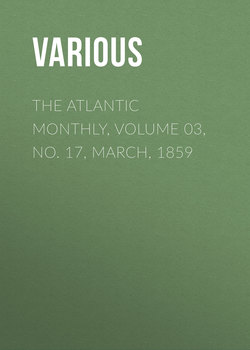The Atlantic Monthly, Volume 03, No. 17, March, 1859

Реклама. ООО «ЛитРес», ИНН: 7719571260.
Оглавление
Various. The Atlantic Monthly, Volume 03, No. 17, March, 1859
HOLBEIN AND THE DANCE OF DEATH
LIZZY GRISWOLD'S THANKSGIVING
ACHMED AND HIS MARE
CHARLES LAMB AND SYDNEY SMITH
BULLS AND BEARS
CHAPTER XV
CHAPTER XVI
CHAPTER XVII
CHAPTER XVIII
THE WATERFALL
THE WINTER-BIRDS
"THE NEW LIFE" OF DANTE
III
THE DOUBLE-HEADED SNAKE OF NEWBURY
A PLEA FOR THE FIJIANS;
THE PROFESSOR AT THE BREAKFAST-TABLE
IRIS
THE OPENING OF THE PIANO
THE UTAH EXPEDITION;
THE MINISTER'S WOOING
CHAPTER VIII
CHAPTER IX
REVIEW
RECENT AMERICAN PUBLICATIONS
Отрывок из книги
At the northwest corner of Switzerland, just on the turn of the Rhine from its westward course between Germany and Switzerland, to run northward between Germany and France, stands the old town of Bâle. It is nominally Swiss; but its situation on the borders of three countries, and almost in them all, has given to the place itself and to its inhabitants a somewhat heterogeneous air. "It looks," says one traveller, "like a stranger lately arrived in a new colony, who, although he may have copied the dress and the manner of those with whom he has come to reside, wears still too much of his old costume to pass for a native, and too little to be received as a stranger." Perhaps we may get a better idea of the mixed nationality of the place by imagining a Swiss who speaks French with a German accent.
Bâle is an ancient city; though Rome was bending under the weight of more than a thousand years when the Emperor Valentinian built at this angle of the river a fortress which was called the Basilia. Houses soon began to cluster round it upon the ruins of an old Helvetian town, and thus Basel or Bâle obtained its existence and its name. Bâle suffered many calamities. War, pestilence, and earthquake alternately made it desolate. Whether we must enumerate among its misfortunes a Grand Ecclesiastical Council which assembled there in 1431, and sat for seventeen years, deposing one infallible Pope, and making another equally infallible, let theological disputants decide. But the assembling of this Council was of some service to us; for its Secretary, Aeneas Sylvius, (who, like the saucy little prima donna, was one of the noble and powerful Italian family, the Piccolomini, and afterward, as Pope Pius II., wore the triple crown which St. Peter did not wear,) in his Latin dedication of a history of the transactions of that body to the Cardinal St. Angeli, has left a description of Bâle as it was in 1436.
.....
Hans Holbein, the greatest painter of the German school, came honestly by his talent and his name. He was the son of Hans Holbein, a painter, who was the son of another Hans Holbein, also a painter. The first Hans was a poor painter; the second a good one; and the third so great, that the world, when it speaks their common name, means only him. The father and grandfather were born at Augsburg, in Bavaria, and of late years it has been asserted by mousing antiquaries that the grandson was born there too; but this, perhaps, is not quite certain; and it is much pleasanter to adhere to the ancient faith, and believe that he was born at that strange old Bâle, in sight of that great Dance, the reproduction, or rather recreation, of which was to make so great a part of his fame,—especially as he was quite surely an inhabitant of the town at such tender years, that the veriest Know-Nothing in the place would not have deprived him of his citizenship.
Of Holbein's life we unfortunately know very little. He showed his talent early, as all the great painters have done. Conscious of his abilities, he devoted himself eagerly to the study of the profession to which his genius urged him. He learned not only painting, but engraving, the sculpture of metals, and architecture; and of all these, it will be remembered, Bâle offered him facilities for study, in examples which must have stimulated both his imagination and his ambition. He did not lack encouragement; for the nobles and burghers of Bâle had begun to acquire a taste for the arts, which their ruder fathers contemned; and they had, at this time, a university in their city, which made them acquainted with Cicero and the orators, of whom Aeneas Sylvius found them so ignorant.
.....